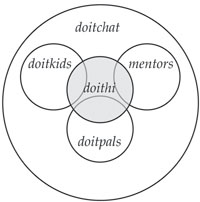Establish a Discussion Group Structure.
When DO-IT had only a small number of participants, there were two e-mentoring community discussion lists, doitkids@u.washington.edu for the DO-IT Scholars and mentors@u.washington.edu for the Mentors. Mentors could communicate with each other on the mentors list, and teens could communicate with each other on the doitkids list. Messages were sent to both addresses simultaneously for conversations that included all Mentors and Scholars, like those labeled E-Community Activity in the remaining chapters of this book. When the DO-IT Pals program emerged, we created a list for these participants, doitpals@u.washington.edu. To better facilitate large-group discussions we eventually set up a distribution list, doitchat@u.washington.edu, that includes all of the members of doitkids@u.washington.edu, mentors@u.washington.edu, and doitpals@u.washington.edu. Discussions that include the full e-community take place on the doitchat list.
As the DO-IT community grew in size, individuals expressed an interest in continuing with large group conversations but also communicating in smaller groups with people whose accommodation strategies are similar to their own. To address this need, we set up several more discussion lists. For example, doithi@u.washington.edu was set up for mentors, near-peers, and protégés who have hearing impairments. Members of this list discuss topics that might not interest the larger community, such as sign language interpreters, FM systems, and cochlear implants. The figure above illustrates how individuals in the doithi group are drawn from members of the other groups.
Similarly, special distribution lists were set up for individuals with visual impairments, learning issues, and other classifications. A lead mentor and at least one DO-IT staff member is included on each distribution list to facilitate communication and to assure that all messages are appropriate.
Example of the DO-IT Discussion List Structure for Participants with Hearing Impairments.

Each doithi member is also a member of doitchat and one of the groups doitkids, doitpals, and mentors.